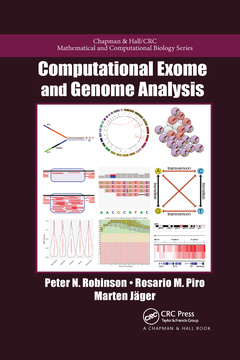Description
Computational Exome and Genome Analysis
Chapman & Hall/CRC Computational Biology Series
Authors: Robinson Peter N., Piro Rosario Michael, Jager Marten
Language: English
Subjects for Computational Exome and Genome Analysis:
Keywords
VCF File; Reference Genome; next generation sequencing; BAM File; WES; Exome Sequencing; WGS; NA12878 Exome; bionformatics; Autosomal Recessive Disease; NGS; Paired End Reads; Rosario M; Piro; Mendelian Disease; Marten Jäger; FASTQ Files; Peter Robinson; VCF; Jochen Hecht; Heterozygous Variant; Peter Hansen; Variant Call; Peter Krawitz; Base Quality Score; Manuel Holtgrewe; SNV; Tomasz Zemo jtel; Annotate VCF File; Max Schubach; PCR Duplicate; Dominik Seelow; Array CGH; Sebastian Köhler; Bed File; Julius O.B; Jacobsen; Info Field; Damian Smedley; FASTQ Format; Johannes Zschocke; Forward Strand; VAF; Prioritizing Candidate Genes; Paired End Sequences; Protein Protein Interaction Network
58.78 €
In Print (Delivery period: 14 days).
Add to cartPublication date: 09-2020
· 15.6x23.4 cm · Paperback
160.25 €
In Print (Delivery period: 15 days).
Add to cartPublication date: 10-2017
· 15.6x23.4 cm · Hardback
Description
/li>Contents
/li>Readership
/li>Biography
/li>
Exome and genome sequencing are revolutionizing medical research and diagnostics, but the computational analysis of the data has become an extremely heterogeneous and often challenging area of bioinformatics. Computational Exome and Genome Analysis provides a practical introduction to all of the major areas in the field, enabling readers to develop a comprehensive understanding of the sequencing process and the entire computational analysis pipeline.
Introduction. Whole Exome and Genome Sequencing. NGS Technology. Illumina Technology. Obtaining WES/WGS Data for this book. Raw Data Processing. FASTQ Format. Raw Data: Quality Control. Trimming. Alignment. Alignment: Mapping reads to the reference genome. SAM/BAM Format. Postprocessing the Alignment. Alignment Data: Quality control. Variant Calling. Variant Calling & Quality-based Filtering. Variant Call Format. Jannovar. Variant Annotation. Variant Calling: Quality Control. Integrative Genomics Viewer (IGV): Visualizing Alignments and Variants. De novo variants. Structural variation. Variant Filtering. Pedigree and Linkage Analysis. Intersection Analysis and Rare Variant Association Studies. Variant Frequency Analysis. Variant Pathogenicity Prediction. Prioritization. Variant Prioritization. Prioritization by Random Walk Analysis. Phenotype Analysis. Exomiser and Geniomiser. Medical Interpretation. Cancer. A (Very) Short Introduction to Cancer. Somantic variants in cancer. Tumor Evolution and Sample Purity. Driver Mutations and mutational signatures.
Peter Robinson is Professor for Medical Genomics at the Charité Universitätsmedizin Berlin, and professor for Bioinformatics at the Free University of Berlin. He studied Mathematics and Computer Science at Columbia University as well as Medicine at the University of Pennsylvania. Peter has led a bioinformatics research group since 2004. He has led the development of the Human Phenotype Ontology, which is used internationally to describe the clinical manifestations of patients with genetic disorders and to empower exome and genome analysis. His group has published algorithms for exome, genome, ChIP-seq and NGS T Cell Receptor profiling.
Rosario M. Piro is an Assistant Professor of Bioinformatics at Freie Universität Berlin and Charité-Universitätsmedizin Berlin, Germany. His research is mainly focused on computational neuropathology, including cancer genetics/genomics of brain tumors as well as network analysis and disease gene prediction for neurological disorders; and computational oncology in general, including the development and evolution of cancers in other organs or tissues. His expertise in next-generation sequencing data analysis techniques is complemented by a past research experience in the field of data-intensive distributed computing.
Marten Jäger is a graduate student in Peter Robinson’s group and has developed pipelines for exome and genome sequencing data. Marten’s work has involved the development of algorithms for variant annotation, exome prioritization, RNA-seq, and integrative genomics analysis.
These books may interest you

The ABCs of Gene Cloning 31.64 €

Applied Computational Genomics 158.24 €

Applied Computational Genomics 158.24 €

